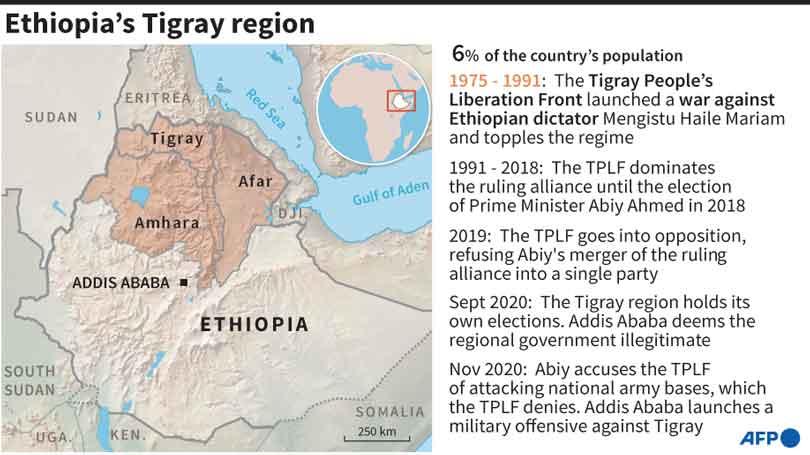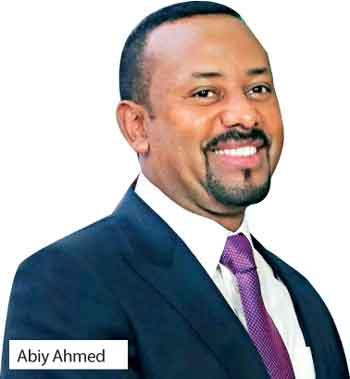
 In December previous calendar year, Abiy Ahmed, Ethiopia’s new Key Minister and Africa’s youngest won the Nobel Peace Prize for his position in courting peace with previous foe, Eritrea and therefore ending the Horn of Africa’s longest-functioning war.
In December previous calendar year, Abiy Ahmed, Ethiopia’s new Key Minister and Africa’s youngest won the Nobel Peace Prize for his position in courting peace with previous foe, Eritrea and therefore ending the Horn of Africa’s longest-functioning war.
Scarcely a year since then, Ethiopia is back again in the thick of one more war, that has now despatched 20,000 refugees throughout the border to Sudan, and stories of ethnic massacres are trickling in. Grave ample, but these particular tragedies are mere footnotes of a bigger disaster for this is a zero-sum war that if the central authorities fails to prevail in, would most likely direct to the disintegration of Ethiopia, Africa’s next-most populous condition together difficult ethnic traces.
Abiy’s new enemy is Tigray People’s Liberation Entrance (TPLF) which was the dominant social gathering of the ruling Ethiopian People’s Revolutionary Democratic Front (EPRDF) until Abiy’s elevation as the Prime Minister in 2018. The TPLF withdrew from the authorities right after Abiy merged ethnic-based mostly regional parties into a single party, recognised as Prosperity Party and when the Central Governing administration postponed regional and nationwide elections this year beneath the pretext of Covid, it went ahead and held its own election in its home turf, Tigray location which is household to 6 million people today, and refused to accept the legitimacy of the Central Govt, which in its component announced the regional election as void. The instant catalyst for the war was an assault on the garrison of federal troops in the Tigray location by TPLF and it led to the Centre to declare war.
In Sri Lanka, pundits have advocated devolution of law enforcement energy as if it is just another kind of administrative electrical power, which it is not
Many observers have pinpointed a wide range of triggers for Ethiopia’s new problems – most of which experienced extended persisted and are structural. But the most noticeable of all is the weak basis of the Ethiopian Point out on ethnic federalism, which pits the Centre against competing for ethnic-centered events and groups in the location.
In 1991, a motley team of parties led by TPLF defeated Derg, the pro-Soviet military Junta that ruled Ethiopia considering that it overthrew the extensive-standing emperor Haile Selassie in 1974. TPLF transformed the centralised state of Ethiopia into a federal ( in principle, a con-federal) condition with nine regional states dependent on ethnicity and two federally administered places. The new constitution was hailed for its promotion of ethnic and cultural exclusivity, while Ethiopia has under no circumstances had aggressive multi-party elections to take a look at these claims. In its place, unelected or appointed ethnic elites ruled the roost in the locations and as prolonged as they remained subordinate to the Centre, none of that mattered.
In the meantime, Ethiopia, which was before recognized for its devastating famine in the 80s. charted a commendable economic journey, and turn out to be a single of Africa’s fasted growing states primarily due to the fact the dawn of this century, its financial system has clocked in close proximity to double-digit expansion annually.
 With relative prosperity and social media, prolonged-suppressed ethnic grievances came to surface as Oromo and Amhara, the biggest and next-premier ethnic teams resented the handle of Tigrayan elite which accounted for just 6 for every cent of the population. Their protests provoked a navy crackdown but finally resulted in the improve of electrical power from the Trigrayan old guard to MrAbiy who is of mixed Oromo and Amhara origin.
With relative prosperity and social media, prolonged-suppressed ethnic grievances came to surface as Oromo and Amhara, the biggest and next-premier ethnic teams resented the handle of Tigrayan elite which accounted for just 6 for every cent of the population. Their protests provoked a navy crackdown but finally resulted in the improve of electrical power from the Trigrayan old guard to MrAbiy who is of mixed Oromo and Amhara origin.
Considering that getting to be Key Minister, Mr Abiy experienced carried out floor breaking democratic reforms, and launched political prisoners and invited exiled groups back again to Ethiopia. Even so, his democratic experiment was punctured by escalating ethno-nationalism in the regions and ethnic unrest which experienced internally displaced nearly three million folks in a variety of areas of the place even right before the start of the new section of the conflict. Now he faces the acid examination of not just democratic reforms, but the survival of the Ethiopian Point out.
For everyone interested in constitutionalism and country-building, Ethiopia is a common reminder of how a condition should not be structured. That is primarily a beneficial lesson for Sri Lanka, where constitutional pundits and their international funders have advocated constitutional options as extensive as confederalism- remember people heydays of the peace course of action when some gurus argued the eventual alternative as one that potential customers to the existence of two armies, a person of the LTTE and the other of the Central Authorities.
In Ethiopia, its federal structure goes as fas as granting self-determination to the extent of cessation. Quasi-armed service police units which were being established up by regional governments to direct counter-insurgency strategies have become formidable armed service forces capable of battling frontal wars.
In Sri Lanka, pundits have advocated devolution of law enforcement power as if it is just a different type of administrative energy, which it is not. In a electrical power maxi-maxing ethnic set up, police powers granted to the provincials can easily transform sour. Even worse continue to in Sri Lanka, the place successive governments have been reactive, and would probable to wait until finally the issue explodes on its face. A purposeful state can not be constituted if there are competing components in the periphery that competes with the centre. The program in Ethiopia worked until eventually the regional elites were beholden to the Centre. Immediately after Abiy took the gene out of the bottle through his democratic experiment, the entire process is now at the mercy of the centrifugal forces of ethnic federalism.
Sri Lanka is not as ethnically diverse as Ethiopia which has 80 recorded ethnicities. Having said that in just our have ethnic and demographic range, it has demonstrated regularly, the actual risk to Sri Lanka as a functional condition has constantly currently being within just. How these disparate teams to be accommodated within just the unified nationwide agenda had brought about problem due to the fact the independence. Nevertheless much of that uncertainty has given that been resolved not so a great deal by negotiation and peaceful engagement , but by the brute force. The JVP which waged two insurgencies, and was subdued by a brutal counter-insurgency campaign is now firmly in the political mainstream. Tamil elites would eschew an additional reckless gambling as extended as the retributive cost of the earlier a person remains in their memory. Easter Sunday attacks have been not agent of the wider Muslim local community, but the increasing Wahhabist fundamentalism and Arabization of the neighborhood is a hard simple fact, and the post-Easter assault scrutiny would incorporate these forces as extended as foreseeable future governments do not toss the warning to the wind.
Sri Lanka can not be peaceful, nor prosperous without having a strong- centralised federal government. Any form of devolution or decentralisation ought to not have competing energy centres. If you violate this basic premise, the new position quo would only be recognized by war.
Nor can Sri Lanka grow prosperous devoid of a centralised state able of providing its writ and growth. If you want a template as to how electrical power sharing be utilised to leapfrog economic improvement, the most effective case in point is not India or Switzerland, but China, which is not a federal condition by any usually means. China is a sturdy centralised condition with a hierarchical framework of ability, which has distributed administrative powers to its provinces, which have provincial budgets greater than center –sized- nation states. Its provincial governments could possibly be rules unto by themselves in their provinces, but finally beholden to the Centre in Beijng, which can come to a decision, almost the daily life and loss of life of its provincial authorities.
Sri Lanka is not a occasion state, which China is, but in follow, any time a new get together is elected to electrical power in the centre, provincial councils observe fit in the next election. North is an outlier, but, some kind of consensus politics can be tried out.
Ethiopia is not the only warning. Before the protests in Catalonia uncovered how federalism, when poised on ethnicity, will become an particularly polarising power even in formulated states. President Gotabaya Rajapaksa is proper when he eschews additional devolution, specially into law enforcement and land powers. But he is completely wrong to attribute that to Sinhala majority’s opposition to devolution. The stubborn reality is that ethnically driven devolution does not remedy the challenge. It postpones the problem so that it could explode 1 day in the long term when the country is least organized to experience it.
Abide by @RangaJayasuriya on Twitter


